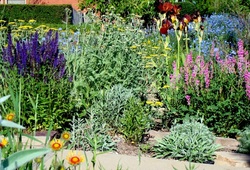 By Laureen Fagan With all the interest in beekeeping and a potential urban beekeeping ordinance in South Bend, it’d be easy enough to think that bee talk is just for the apiculture enthusiasts. But many people can “keep bees” and support bee populations through the gardening plants they choose and practices they use. By now, most people know why it’s important. Bee populations are suffering from mysterious fatal conditions that include colony collapse disorder, with losses upward of 30 percent. It’s a worldwide problem – and it’s your problem, because according to a 2010 United Nations Environmental Programme report, bees pollinate about 71 percent of the top 100 food crops grown around the globe. I’m not interested in beekeeping. I don’t want hives in my yard. Frankly, I’d like to have the suit just for the mosquitoes sometimes! But I do garden to support bees, butterflies and other beneficial insects, and here’s a few ideas for how you can be a “beekeeper” at home in the yard, garden – or even balcony. 1. Choose plants that attract and support bees, and plant so that there’s always something in bloom that’s providing nectar and pollen. Consider native plants – at home, the bees love the spiderwort and sunflowers. Also consider herbs and small fruit in the garden. My strawberries and raspberries love the bees, and the bees love them. Leave your milkweed for the beneficials, and don’t forget to think about your lawn as a “beekeeper” too. That’s a lot of clover for the bees. There’s a great resource for bee-friendly plants in the Great Lakes region atxerces.org 2. Limit the use of insecticides. Lots of people are talking about the neonicotinoid use in U.S. agriculture, but some home products – carbaryl (Sevin) as one example – are highly toxic too. 3. Create a nesting habitat and provide shelter for bees. “While most people are not equipped to raise honeybees in their backyard, creating nesting habitats for native bees is surprisingly simple,” say the experts at University of Illinois. And don’t forget the H2O. Bees and butterflies drink too, and during hot dry spells may need help finding water.
0 Comments
|
ContributorsWe love to feature blogs from all of the members of our team, including core staff, interns, volunteers, and others. We hope you enjoy the stories and find the information useful! Archives
January 2023
Categories |
AddressLaSalle Square
3701 Prast Blvd. South Bend, IN. 46628 |
Hours
Garden: always Welcome Center Mon-Sun: 9am-7:30pm |
Telephone574-222-2266
After Hours: 574-315-4361 |
Unity Gardens
PO Box 10022 South Bend, IN. 46680 |

 RSS Feed
RSS Feed